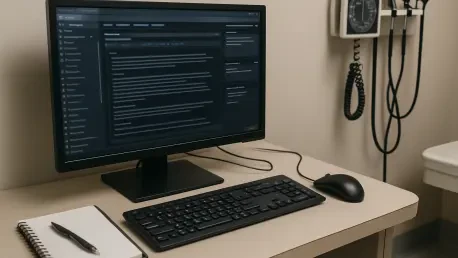Imagine a healthcare system where clinicians spend more time with patients than on paperwork, where administrative burdens no longer hinder care delivery, and where every step from patient encounter to reimbursement flows seamlessly. This vision is becoming a reality through groundbreaking advancements in technology, particularly with the integration of artificial intelligence into healthcare workflows. A leading player in this transformation is making waves with innovative solutions that address long-standing inefficiencies in clinical and financial operations. By leveraging AI-driven tools and connected platforms, the industry is witnessing a shift toward smarter, more efficient care delivery that prioritizes both patient outcomes and organizational sustainability. This development marks a pivotal moment in addressing the challenges faced by healthcare providers today.
Unveiling Cutting-Edge AI Solutions
Pioneering AI Integration at Industry Summits
At a prominent healthcare summit held in Scottsdale, Arizona, from September 4-7, a significant announcement captured the attention of industry leaders and technology enthusiasts alike. The unveiling of an ambient AI scribe named Scribble Now, integrated into revenue cycle management (RCM), coding, and clinical documentation workflows, set a new benchmark for connected healthcare platforms. This integration establishes an unprecedented encounter-to-reimbursement system, streamlining the entire patient care journey. Showcased during a session titled “The Future Is Connected: Data, AI, and the Next Era of Care,” this innovation highlights the potential of AI to transform how clinical interactions are captured and converted into revenue. The platform, built on Google Cloud, connects pre-visit, visit, and post-visit activities into a cohesive workflow, ensuring accountability and precision at every stage. This development reflects a growing recognition of the need for interconnected systems to tackle the complexities of modern healthcare delivery.
Transforming Workflows with Connected Technology
The impact of this AI-driven platform extends far beyond a single tool, as it redefines the operational landscape for healthcare organizations. Scheduling processes are now optimized to prioritize the needs of patients and clinicians over rigid software limitations, resulting in measurable gains in efficiency. Clinical documentation is customized to support medical professionals, freeing up critical time for direct patient interaction. Administrative tasks, such as managing inboxes, handling documents, and processing refill requests, are drastically reduced, saving thousands of hours for care teams. Furthermore, prior authorizations are managed proactively to minimize denials, protecting revenue streams and lowering denial rates. By blending AI capabilities with human expertise, this system ensures that the entire process is enhanced holistically, rather than merely automating isolated components. Such advancements signal a shift toward a more balanced and effective healthcare environment.
Driving Efficiency and Better Outcomes
Enhancing Clinician Focus Through AI Support
One of the standout benefits of integrating ambient AI scribes into healthcare workflows is the relief it provides to clinicians from overwhelming administrative duties. By automating and streamlining documentation and operational tasks, this technology allows medical professionals to dedicate more time to practicing medicine and engaging with patients. The reduction in paperwork and backend responsibilities translates to improved patient outcomes, as clinicians can focus on delivering personalized care. Additionally, the platform’s ability to connect various stages of the patient journey ensures that no detail is overlooked, from initial scheduling to final billing. This comprehensive approach not only boosts efficiency but also fosters a more patient-centric model of care. Industry leaders have noted that such innovations are critical in addressing burnout among healthcare providers, paving the way for a more sustainable workforce.
Building Financial Sustainability with Smart Systems
Beyond clinical improvements, the integration of AI into RCM workflows offers substantial financial advantages for healthcare organizations. The connected platform minimizes errors in coding and documentation, ensuring accurate reimbursement and reducing revenue leakage. Proactive handling of prior authorizations further safeguards financial stability by cutting down on claim denials. This system, recognized as a top performer in AI-driven RCM services by independent evaluators, demonstrates how technology can drive smarter operations while supporting long-term growth. Established as a trusted partner for major health systems and physician groups across the United States, the company behind this innovation continues to set the standard for combining AI with human expertise. The result is a robust framework that not only enhances operational efficiency but also secures the financial health of organizations, allowing them to reinvest in patient care and innovation over the coming years.
Reflecting on a Milestone in Healthcare Innovation
Looking back, the introduction of Scribble Now into revenue cycle management workflows during the recent healthcare summit marked a defining moment in the evolution of care delivery. This connected encounter-to-reimbursement platform tackled persistent inefficiencies in scheduling, documentation, and financial processes with a blend of AI and human insight. The success of this initiative underscored a broader industry shift toward integrated, technology-driven solutions that prioritized both clinical quality and operational sustainability. As healthcare continues to evolve, the focus should shift to scaling such innovations across diverse settings, ensuring accessibility for smaller practices and underserved regions. Exploring partnerships and further advancements in AI capabilities will be key to addressing emerging challenges. This milestone serves as a reminder of technology’s potential to transform lives when guided by a vision of connected, compassionate care.









